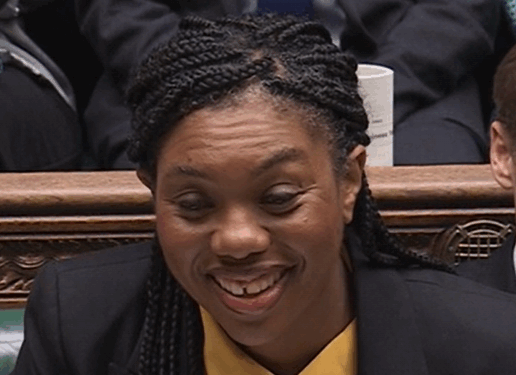If you wish to see unbridled joy on Conservative faces, turn to the photograph of the front bench adorning Tali Fraser’s piece a few days ago about Kemi Badenoch’s recent victories at PMQs.
Such uninhibited laughter, mouth open, head flung back, cannot be faked. Sir Keir Starmer and Rachel Reeves have by their incompetence spread dismay and dissension on their side of the House, and contributed to a great revival of morale on the official Opposition benches.
When, the impatient may ask, will this revival lead to a decisive Conservative recovery in the polls? The answer is that such a recovery may never happen, and even if it does, can be expected to take a long time.
Starmer and Reeves have demonstrated, to their vast embarrassment, that there is no easy way to put the public finances on a sustainable footing. The NHS and wider welfare state make such insatiable demands for money that other public services such as the criminal justice system are chronically under-funded, electoral pledges about not raising taxes have become almost impossible to keep, and lenders require a higher premium for filling the gap between spending and revenue.
The Conservatives are a long way from demonstrating that they can do any better.
Reform of the British state will require careful preparation. A team will be needed who have done the necessary economic analysis, and can at the same time change the climate of opinion, by making the moral arguments for a new approach.
Beveridge designed the welfare state as an insurance scheme, and traces of his conception can still be found in such terms as National Insurance, and in our inclination to say, when we receive some benefit, that we have paid in, so are entitled to take money out.
Pre-Beveridge there was already a vast network of provision, much of it voluntary, but containing gaps which the universal system was intended to fill.
Few if any of those who devised the new system foresaw how great the demand for free services would be: the great reforming Labour Government of 1945-51 found itself obliged to introduce charges for dentures and spectacles, and came under pressure from the Treasury to charge for prescriptions.
Politicians realised they could sound high-minded, and even believe themselves high-minded, by demanding that the state close any remaining gaps in provision, so that no one was left without the necessities of life.
Here was a temptation to bribe the voters with the voters’ own money. This temptation was felt as much by the Conservatives as by anyone else: the pension triple-lock is an electoral bribe on a colossal scale.
It also came to be believed that whenever something goes wrong, the state must pay compensation. This assumption holds even for terrible events which cannot possibly be made up for by cash handouts.
State provision has the appalling drawback of undermining voluntary provision. Great independent foundations, some of which had existed for centuries, lost their freedom and were subjected to control from Whitehall.
Whenever something went wrong, the cry went up for even stronger control by Whitehall. This remains the case. Public inquiry after public inquiry issues recommendations to the state bureaucracy, usually more or less identical to previous recommendations, but seldom acted upon by the bureaucracy, which puts its own interests above the public interest.
The NHS is in many ways admirable, but it often makes one feel, as a patient, like a supplicant, who should be grateful for whatever he or she is fortunate enough to be given, even if it is only a chair in an Accident and Emergency department at four o’clock in the morning.
Consider the words of that great Tory, T.E.Utley:
“The notion that compassion is something which can be delegated to the State is one of the cruellest fallacies of collectivism.”
Utley, who died in 1988, was a distinguished contributor to The Times and The Daily Telegraph, but made that observation in a pamphlet for the Conservative Research Department in 1980, entitled Capitalism: The Moral Case.
He was too wise, and realistic, to pretend that capitalism was perfect, but observed that “socialism assumes a degree of ministerial and bureaucratic infallibility which no human being, however talented, can be expected to possess”.
This is one of the arguments which Conservatives need now to make. The state pretends to a competence it does not possess. It attempts to do far too much, and exercises its functions through a bureaucracy which finds the admission and correction of error almost impossible.
This is not a new problem, but one which arises in all bureaucracies, resistant as they are to criticism and innovation: see the shameful failure in the autumn of 1854 to provide medical services for sick and wounded British soldiers during the Crimean War. The Times, by reporting this scandal to an enraged public, and Florence Nightingale, by taking charge of the hospital at Scutari and inventing modern nursing, together exposed and repaired the shortcomings of military officialdom.
But while official persistence in error is not new, it is now more widespread, for officials have been handed control of vast tracts of national life, and are naturally inclined to place their own convenience above that of the public in whose name they act.
These are arguments which Conservatives need to start making. Many are the pitfalls along the way: conservatism is bound to be misrepresented as Manchester liberalism, a ruthless economic doctrine which lets the devil take the hindmost.
On the contrary: Conservatives hold that those who are prosperous have a moral duty to help those who are weak, and that this duty cannot be delegated to the state. Every minute of every day we see this morality acted upon within families, and in many kinds of charitable enterprise where private individuals, often led by an inspiring figure, set out to meet some crying need.
No wonder Starmer and Reeves look exhausted. They preside over a state which is attempting at intolerable expense to do far too much, and they have no idea how to escape this predicament.
Conservatives know the state can only work properly if it is relieved of some of its burdens. They also know that money should be allowed to fructify in the pockets of the people.
These two insights can in time be combined. Once public spending is brought under control, tax cuts become possible, and a virtuous circle can replace the present doom loop.
None of this will be easy, but only the Conservatives are in a position to attempt it. Voters who remain determined to protest, and only to protest, will continue to support Nigel Farage or Zack Polanski.
Voters who at the next election see that Badenoch and her colleagues have worked out a more constructive programme, one which attends to human nature as it is, rather than human nature as it ought to be, might – but only might – be persuaded to return to the Conservatives.









![Florida Officer Shot Twice in the Face During Service Call; Suspect Killed [WATCH]](https://www.right2024.com/wp-content/uploads/2025/12/Inmate-Escapes-Atlanta-Hospital-After-Suicide-Attempt-Steals-SUV-Handgun-350x250.jpg)

![Keith Ellison Caught Promising to Fight State Agencies for Somali Fraudsters [WATCH]](https://www.right2024.com/wp-content/uploads/2026/01/Keith-Ellison-Caught-Promising-to-Fight-State-Agencies-for-Somali-350x250.jpg)





